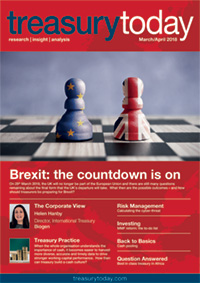Contents
- Editorial
- Trump and the Davos dream
- Adam Smith Awards 2018
- Last chance to make your mark!
- insight & Analysis
- Brexit: the countdown
- Investing
- MMF reform: a to-do list
- Smarter Treasury: Citi
- Automating treasury: taking a fresh look
- Treasury Practice
- Cash first: how changing company cash culture can improve forecasting
- The Corporate View
- Corporate View: Helen Hanby, Biogen
- Risk Management
- Held to ransom
- Special Feature: Openlink
- How technology is helping treasurers deliver strategic advantage
- Back to Basics
- Pool party
- Webinar Report: BNP Paribas
- Better collections management
- Question Answered
- Question Answered: Treasury in Africa
- Market View
- The unintended consequences of US fiscal policy
Editorial
Trump and the Davos dream
When President Trump took to the stage to deliver his 16-minute speech on the closing day of the 2018 World Economic Forum (WEF) in Davos, was there a feeling that his hitherto hard-boiled “America First” manifesto had softened?
More than one pundit commented that his uncontroversial tone sounded like one crafted to be more palatable to foreign leaders.
WEF is of course all about celebrating globalisation. Temporarily deaf to his own criticism of “the false song of globalism”, perhaps President Trump sat up the night before and read the WEF publication, “Strategic Brief on Misconceptions around Trade Balances”, leading him to reason that a more mollifying approach would yield better results.
According to the Washington Post and Reuters, the Strategic Brief argues against the views espoused by certain countries that trade policies developed over the last couple of decades have led to large trade deficits and a decline in manufacturing employment.
These anti-globalisation narratives have, says the Brief’s co-authors, Harvard professor Robert Lawrence and Princeton fellow Yeling Tan, recently emerged in “the United States as well as elsewhere” (it didn’t name the other countries).
President Trump’s constant displeasure with “unfair” and “bad trade deals” has seen him take or seek action on multilateral deals such as the Trans-Pacific Partnership (which he has pulled out of) and the North American Free Trade Agreement (in which he has tried to get Canada and Mexico to renegotiate on his terms). It is no secret too that the US’s major trade deficit with China is a constant source of irritation for the Trump administration.
The perceived unfairness to the US of such trade imbalances is viewed by the WEF pair as a “misconception”. They argue that if such a free trade agreement allows a country to meet more of its needs by importing at lower costs from a particular partner, it will benefit, regardless of the imbalance.
President Trump’s America First mantra that trade deficits mean job losses is thus refuted. The authors argue that “rapid import growth and larger trade deficits have been associated with faster employment growth”. Manufacturers can buy in cheap parts to make their goods, which they can sell for less, so people buy more, so more jobs are created. New barriers to trade, on the other hand, “could disrupt production and reduce rather than increase domestic employment in both the protected industries and those that use their outputs”.
With President Trump now considering the imposition of restrictions on the import of steel and aluminium as a measure aimed principally at China (but likely to hit the EU too), ‘America First’ it seems is alive and well. For global businesses, Trump’s stance poses several issues, most notably increasing the risk of a trade war. This could be very disruptive to today’s highly integrated global economy and something businesses will want to avoid at all costs.
Whether a trade war materialises or not, Trump’s stance requires all corporates to take a close look at their supply chains and how they are doing business to evaluate if this will still be cost effective going forward. The skills of the treasurer will undoubtedly be called into action here to help manage this process and any undue risk.


